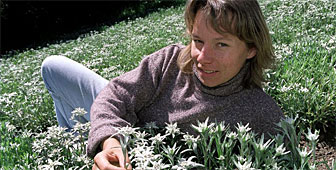Weleda products find favour with the stars

A pioneer of natural medicines and cosmetics, the Swiss firm Weleda is benefiting from the current popularity of “green” personal care products.
Recently, Hollywood has taken notice, with stars such as Will Smith, Oprah Winfrey and Meg Ryan converting to Weleda skin, hair and medicinal products.
But company spokesman Michael Leuenberger says the products have been around too long to be considered flavour of the month.
“Our products are for everyone. Our customers are basically sensitive to environmental issues, ecology and biodiversity, and they prefer natural products.”
Based in Arlesheim, near Basel, Weleda’s story in some ways resembles that of the ugly duckling turned to swan.
For a long time product lines appealed to a narrow group of consumers, mainly committed ecologists, said Leuenberger.
Holistic approach
The company was set up in 1921. Weleda cofounder Rudolf Steiner believed that tapping into the human spirit could stimulate healing, a holistic philosophy he called “anthroposophy”.
Steiner’s anthroposophical movement built a headquarters in Dornach, not far from Basel, in 1913. Known as Goetheanum, the centre remains the majority Weleda shareholder today.
But these days, Weleda customers don’t inevitably follow the holistic philosophy. About five years ago, Weleda became trendy.
“The majority of customers don’t know the origins of Weleda are in anthroposophy,” said Valerie Fournier, beauty editor for the Swiss women’s magazine “Edelweiss”. “That’s not what they are buying.”
“It’s a reliable brand with a certain history, and not at all like the luxury brands which introduce new products every month,” said Fournier.
World group
Weleda’s recent success isn’t just down to the insistence on natural products, says Leuenberger.
In the mid 1990s, Weleda repackaged itself and went global, with 20 branches and three production facilities in France, Germany and Switzerland.
Commercially, the products – herbal remedies (45 per cent), personal care products (50 per cent), juices and syrups (five per cent) – have spread from shops selling organic produce into a wider range of stores. Weleda even has its own shops in Japan.
“Our objective was to extend beyond our niche market,” said Leuenberger. “Today, Bernd Kreutz, the German specialist in brands and marketing, puts Weleda in the top 35 brands in the world.”
Product range
Group sales have doubled within ten years, topping SFr233 million ($184 million) in 2003 and including SFr31.6 million in Switzerland, where complementary therapies are relatively well accepted.
Among Weleda’s 4,000 products, this year’s sun cream and last year’s new hand cream scored major gains in a tough market.
The next challenge is the untapped potential of men’s products.
“The market is tougher than five years ago,” said Leuenberger. “But we feel people are still looking for new natural products.”
swissinfo, Pierre-François Besson
Weleda sells approximately 80% of its products in Europe – particularly in Germany, France and Switzerland.
The group has 20 subsidiaries across the world.
It employs 1,300, including 150 in Switzerland.
In 2003, sales increased by 7.3%, to SFr233.2 million.
Profit rose by 44%, to SFr6.4 million.
The group will soon start expanding its Swiss operation, located in Arlesheim, with a new manufacturing and administration building.
Weleda is the name of a goddess healer of German mythology.
The company says its products tap into a spiritual force.

In compliance with the JTI standards
More: SWI swissinfo.ch certified by the Journalism Trust Initiative


You can find an overview of ongoing debates with our journalists here. Please join us!
If you want to start a conversation about a topic raised in this article or want to report factual errors, email us at english@swissinfo.ch.